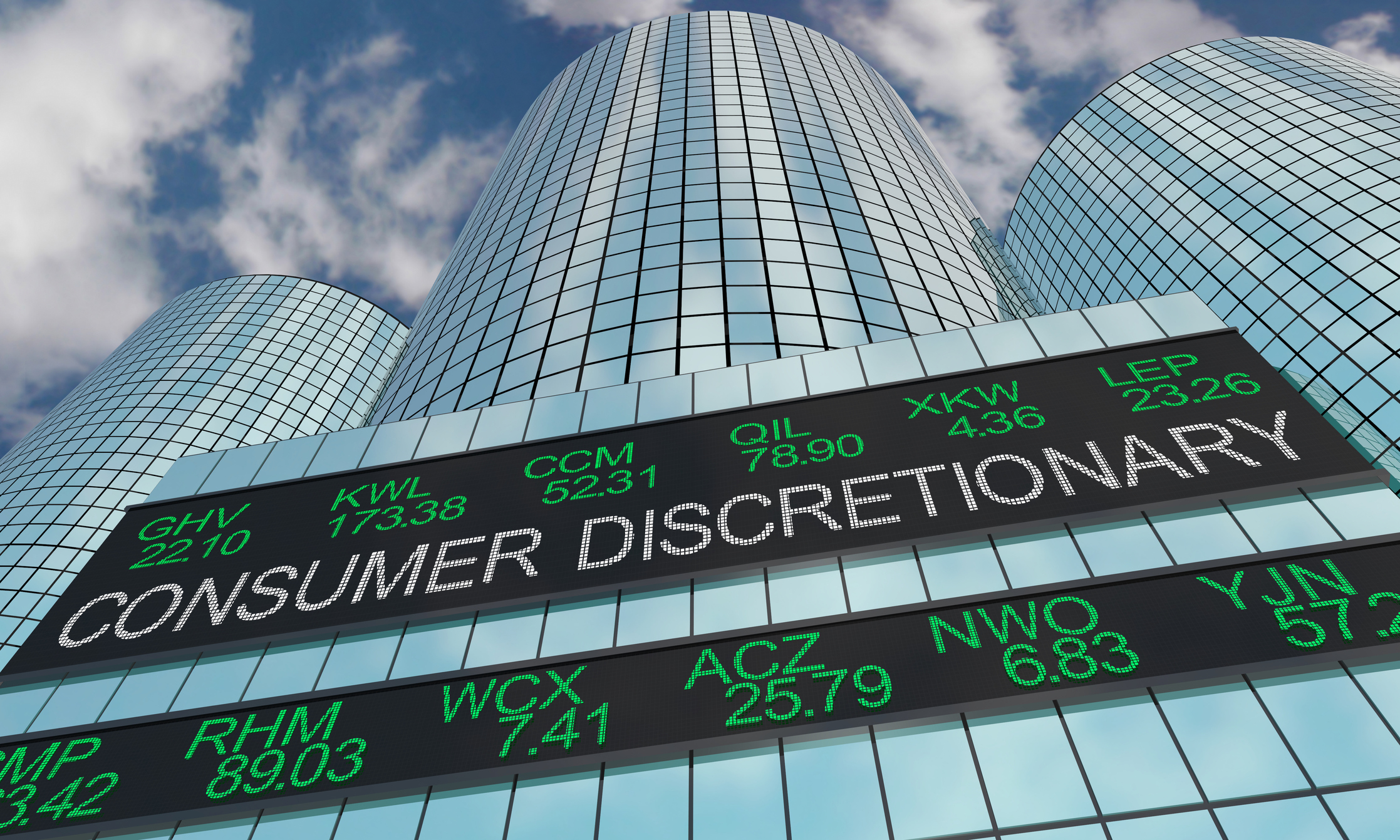When it comes to shopping, there are things you need and things that are just nice to have. The consumer discretionary sector is in that second category. It includes goods and services that people spend money on when they have a little extra cash available, such as travel, dining at restaurants, or fashion and jewelry.
Consumer discretionary stocks refer to the stocks of companies that make money from consumer discretionary goods. They could be manufacturers, wholesalers, or retailers.

Unlike consumer staples companies, which make necessities, consumer discretionary stocks tend to do well when the economy is strong and poorly when times are tough. Keep reading to learn about the consumer discretionary sector and some top stocks to consider.
The COVID-19 pandemic affected the consumer discretionary sector differently than it did the consumer staples sector, which sells necessities.
Understanding consumer discretionary stocks
Consumer discretionary businesses cover several industries, but they all rely on consumers spending money that they don't need to spend. Consumer discretionary companies include:
- Makers of furniture, appliances, housewares, and other home furnishings
- Consumer electronics manufacturers
- Apparel and luxury goods companies
- Retailers of various kinds, including department stores, home improvement retailers, electronics retailers, home furnishers, and clothing stores
- Direct-to-consumer retailers that sell goods by catalog, mail, or via e-commerce
- Hotel, resort, and casino operators
- Restaurants
- Cruise operators
Consumer discretionary stock prices tend to rise and fall with the overall economy, making them cyclical stocks. For example, high interest rates put pressure on consumer spending and cool off the economy, presenting a challenge for consumer discretionary companies (although interest rate cuts can encourage growth).
Focusing on well-known brands and industry leaders in this sector is generally a formula for success since many top stocks have been winners for investors for a long time. These companies should also be better able to weather a recession and endure a bear market, since they have deeper pockets and brand equity to fall back on.
Best consumer discretionary stocks in 2026
Several consumer discretionary companies stand out as being among the best in their industries:
| Name and ticker | Market cap | Industry |
|---|---|---|
| Nike (NYSE:NKE) | $90.2 billion | Textiles, Apparel and Luxury Goods |
| Starbucks (NASDAQ:SBUX) | $106.0 billion | Hotels, Restaurants and Leisure |
| McDonald's (NYSE:MCD) | $227.5 billion | Hotels, Restaurants and Leisure |
| TJX Companies (NYSE:TJX) | $168.9 billion | Specialty Retail |
| Walt Disney (NYSE:DIS) | $184.8 billion | Entertainment |
1. Nike

NYSE: NKE
Key Data Points
2. Starbucks

NASDAQ: SBUX
Key Data Points
The coffee company plays a significant role in how a large part of the world's population begins their day. By introducing the European cafe concept to the U.S., Starbucks (SBUX +4.25%) tapped into consumers' desire to treat themselves to affordable luxuries, and its premium beverages now have a loyal following worldwide.
Starbucks has struggled recently as low-priced competitors have taken market share in China, and consumer demand has been weak in the U.S. Additionally, the company seems to be suffering operationally due to a bloated menu and slow service, especially for Mobile Order & Pay customers.
In August 2024, the company hired Brian Niccol, who led the turnaround at Chipotle (CMG +1.77%), to be its next CEO. Investors are hopeful that Niccol can bring Starbucks back to steady growth and restore the business to its full potential.
As of late 2025, the company had more than 40,000 locations across the globe, and it expects to have 55,000 locations by 2030, indicating no shortage of growth opportunities. Beyond its cafes, the company also has a healthy business selling in-store products, such as bagged coffee and ready-to-drink beverages.
3. McDonald's

NYSE: MCD
Key Data Points
McDonald's (MCD +1.24%) has come a long way since its beginnings in the mid-20th century, and the fast-food colossus has worked hard to keep up with the times. Innovations such as digital menus that automatically change throughout the day, automated kiosks for ordering, online and mobile order capabilities, and delivery options are making McDonald's more accessible than ever.
At the same time, the restaurant chain continues to emphasize value, which keeps customers coming back for more. In 2025, it introduced a new McValue menu with a $5 meal deal and a "Buy One, Add One for $1" option.
Although it's a restaurant chain, the emphasis on value gives it some elements of a consumer staples company. After all, everybody needs to eat, and getting a cheap and convenient meal at McDonald's is easy.
The company also owns much of the real estate that its franchised restaurants occupy. This enables it to collect rent while franchisees do the hard work of running the restaurants.
Even in the ever-changing restaurant industry, McDonald's has found a way to stay relevant, and it's returned to sales growth thanks in part to its renewed focus on value. Investors also like McDonald's for its consistent dividend payments. It has increased payments to shareholders each year since the mid-1970s, making the company a Dividend King. With a payout ratio of around 60% of earnings, McDonald's can comfortably maintain its dividend.
4. TJX Companies

NYSE: TJX
Key Data Points
Off-price retail giant TJX Companies (TJX +1.23%) has found success in apparel and home goods with a business model that's not easily replicated online. The parent company of TJ Maxx, Marshalls, and HomeGoods obtains discounted brand-name merchandise through close-out sales, manufacturer errors, and order cancellations. It then sells the merchandise at discounts of 20% to 60%.
The company's business has generated wide profit margins and solid growth over the years. It plans to expand to at least 7,000 stores globally, up from about 5,100 today.
TJX is also one of the rare discretionary retailers that delivered solid growth in 2024, helped by its off-price model. Revenue rose 4% to $56.4 billion in 2024, or 6% when adjusted for the extra week in 2023, and earnings per share jumped 10% to $4.26, or 12% when adjusted for the calendar shift, demonstrating the versatility and strength of the company's business model. Its growth has continued into 2025.
5. Walt Disney

NYSE: DIS
Key Data Points
This household name in family entertainment has been a staple of U.S. pop culture for generations. Walt Disney's (DIS +2.84%) theme parks and animated movies are popular everywhere. Today, the company also owns ABC, ESPN, Pixar, Marvel, Star Wars, and Hulu, and it acquired a vast array of assets from Fox in a 2019 deal.
Disney has a number of competitive strengths, including an unrivaled trove of intellectual property and a business model that enables successful movies, such as Frozen, to be spun into multiple business lines, including theme park rides, toys, consumer products, and even live entertainment.
Disney has restructured its entertainment business to make Disney+ its centerpiece, and its streaming business is finally profitable. Disney stock has underperformed for several years now, but the components are in place for success if it can successfully transition to streaming. The company plans to launch the streaming version of the flagship ESPN network, called ESPN Unlimited, in the fall of 2025, and that could help drive significant profit growth.
Pros and cons of investing in consumer discretionary stocks
Like any other sector, investing in consumer discretionary stocks has its pros and cons.
Pros:
- Made up of brands that are familiar to most investors.
- Can be big winners over time.
- Easy to assess their performance.
- Tend to do well in bull markets.
- Competitive advantage can be identified by brand strength.
Cons:
- Among the first businesses to get hit in a recession.
- At risk of black-swan events like the COVID-19 pandemic.
- Competition tends to be high.
- Inflation is a risk.
Factors to consider when choosing consumer discretionary stocks
In addition to factors that are worth considering with any stock, like growth rate and valuation, there are some things particular to consumer discretionary stocks.
- Brand strength: Brand isn't easy to measure, and it can change over time, but strong brands tend to correlate with strong stocks in the consumer discretionary category.
- Line of business: There is a range of subsectors in the consumer discretionary sector, and it's important to understand the nuances of industries like travel, restaurants, entertainment, and home goods. Some of these, for example, may be affected by tariffs.
- Exposure to the economic cycle: Most consumer discretionary stocks are sensitive to the economic cycle, but some are more so than others. You'll want to consider the degree of exposure a stock as a casino will be considerably more cyclical than a fast-food stock like McDonald's.
Related investing topics
How to invest in consumer discretionary stocks
Investing in consumer discretionary stocks is just like buying any other stock. Here's what you have to do:
- Open your brokerage app: Log in to your brokerage account where you handle your investments.
- Search for the stock: Enter the ticker or company name into the search bar to bring up the stock's trading page.
- Decide how many shares to buy: Consider your investment goals and how much of your portfolio you want to allocate to this stock.
- Select order type: Choose between a market order to buy at the current price or a limit order to specify the maximum price you're willing to pay.
- Submit your order: Confirm the details and submit your buy order.
- Review your purchase: Check your portfolio to ensure your order was filled as expected and adjust your investment strategy accordingly.













